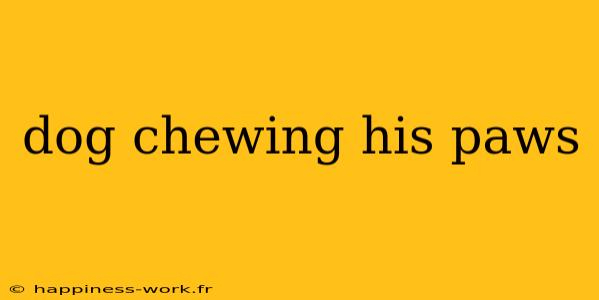It's not uncommon to see your furry friend chewing on their paws from time to time. While it may seem like an innocent behavior, it could indicate a deeper issue. In this article, we’ll explore the reasons behind dogs chewing their paws, how to identify if it’s a problem, and practical solutions to help your canine companion.
What Causes Dogs to Chew Their Paws?
1. Allergies
One of the most common reasons dogs chew their paws is due to allergies. These can be triggered by various factors, including:
- Food Allergies: Certain ingredients in dog food may cause allergic reactions.
- Environmental Allergies: Pollen, mold, or dust mites can irritate sensitive skin.
Practical Example: If your dog chews their paws after a walk in the park, they might be allergic to the grass or plants they come into contact with.
2. Boredom or Anxiety
Dogs that lack physical or mental stimulation may resort to chewing as a way to relieve boredom. Similarly, anxiety can manifest in behaviors such as paw chewing, especially in dogs that experience separation anxiety.
Analysis: Providing your dog with regular exercise, interactive toys, and mental challenges can significantly reduce boredom-related chewing.
3. Skin Irritations or Injuries
Infections, cuts, or irritations can lead a dog to chew on their paws to alleviate discomfort. If your dog's chewing is accompanied by swelling or redness, it’s essential to consult a veterinarian.
Tip: Check your dog's paws regularly for signs of injury or irritation, especially after outdoor activities.
4. Habitual Behavior
Sometimes, paw chewing can become a habit or compulsion, similar to nail-biting in humans. This behavior may not stem from any physical problem but rather become ingrained over time.
How to Determine if Paw Chewing is a Problem
Identifying when paw chewing becomes an issue is crucial for your dog’s health. Here are some questions to consider:
- Is the chewing frequent or persistent?
- Are there any visible signs of irritation or injury?
- Is your dog displaying signs of distress or anxiety?
If the answer is 'yes' to any of these questions, it’s time to take action.
Solutions to Stop Paw Chewing
1. Consult Your Veterinarian
Before taking any action, it’s wise to have your dog evaluated by a veterinarian. They can rule out allergies or infections and suggest appropriate treatments.
2. Modify Your Dog’s Diet
If food allergies are suspected, consider switching to a hypoallergenic dog food. Consult with your veterinarian for the best options tailored to your dog’s needs.
3. Increase Physical and Mental Stimulation
Engage your dog in daily exercise through walks, play sessions, or even dog sports. You can also introduce puzzle toys and training games to keep their mind active.
4. Use Positive Reinforcement
If your dog tends to chew their paws out of boredom or habit, redirect their attention to a toy or activity. Reward them when they choose not to chew their paws.
5. Consider Anxiety-Reducing Strategies
For dogs with anxiety, implementing calming techniques, such as anxiety wraps or pheromone diffusers, can be beneficial. Additionally, creating a comforting space for them may alleviate some of their stress.
Conclusion: A Balanced Approach to Paw Chewing
In conclusion, understanding why your dog chews their paws can help you find effective solutions. Whether it’s due to allergies, boredom, or anxiety, there are various strategies to address this behavior. By consulting with a veterinarian and providing your dog with a stimulating environment, you can help them lead a healthier, happier life.
Additional Resources
For further reading on dog behavior and care, consider visiting the following links:
Attribution
This article was inspired by the content available on WikiHow. The original authors have provided valuable insights into the topic of dogs chewing their paws, which served as a foundation for further analysis and additional suggestions.
Keywords
Dog chewing paws, dog allergies, dog behavior, paw irritation, dog anxiety solutions, pet care tips.
By taking proactive measures, you can ensure your dog remains healthy and happy, free from the discomfort of excessive paw chewing.
